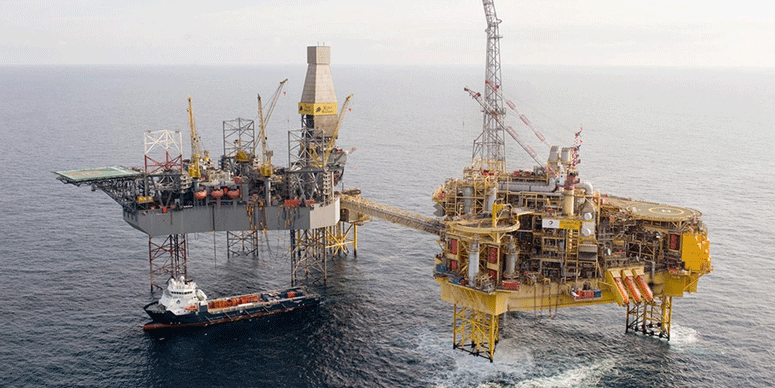Fine, thought to be largest imposed on a North Sea operator, welcomed by environmental campaigners but union leaders fear it will have little impact
Total’s Elgin platform, which was closed for nearly a year when an estimated 6,000 tonnes of gas leaked in 2012. Photograph: Total E and P UK Ltd/PA
The French oil and gas multinational Total has been fined more than £1m for safety breaches that led to a major leak at its Elgin platform in the North Sea.
Total will pay £1.125m – thought to be the largest fine imposed on a North Sea operator – and court costs, after it was prosecuted by the Health and Safety Executive, pleading guilty at Aberdeen sheriff court.
The Elgin field gas leak in March 2012 led to the evacuation of 238 staff from the main platform about 150 miles off Aberdeen and of workers from two adjacent platforms.
The HSE estimates the 6,000 tonnes of gas which escaped would have filled 300 road tankers.
The platform, which accounted for 3% of total UK gas production, was closed for nearly a year after the leak.
Observers believe a disaster was averted because winds kept the plume of gas away from nearby flares. The petrol condensate that spread across the sea around the rig risked causing serious damage to nearby marine life.
The hefty fine was welcomed by environment campaigners, who had feared a far lower punishment after Shell was fined £22,500 by a Scottish court in November after 200 tonnes of oil leaked from a pipeline at its Gannet Alpha platform in 2011 – the worst for a decade.
“The gas leak at the Elgin platform endangered lives, cost the company millions and added to climate change,” said Lang Banks, director of WWF Scotland. “It’s therefore good to see a fine that reflects the seriousness of the incident. Hopefully the outcome of this case will send a clear message to the rest of the oil and gas industry to massively improve safety procedures.”
But trade union leaders said the cash was still insignificant against Total’s total profits: the court should have ordered the HSE and Total to publish all their internal investigation findings into the background to the leak, they said.
Jake Molloy, the oil industry representative for the RMT, said the pre-trial negotiations and Total’s guilty plea meant some of the key information about the cause and handling of the leak would never be made public.
“How hefty is hefty when a firm is making a million pounds an hour?” Molloy said. “Total, like so many other producers, has come into court, pleaded guilty and begged forgiveness, and assured us all that it won’t happen again.”
Releasing the investigation reports would be far more effective in exposing the industry to proper scrutiny and accountability, Molloy added.
“It would send a pretty powerful message to the industry that it would be held to account publicly, rather than just being allowed to write off its fine in its accounts at the end of the year.”
Molloy said the nearest fine of this magnitude following a North Sea safety breach was a £1m fine for Shell after two workers were killed on its Brent Bravo installation in 2003. But Shell was given a 10% discount on the fine for cooperating with the HSE, he said.
A fatal accident inquiry in Aberdeen in 2006 ruled the workers’ deaths, after breathing hydrocarbon fumes while working 170 metres down a platform leg, were preventable as Shell had failed to properly repair a leaking pipeline that it knew was a risk.

 石油圈
石油圈

